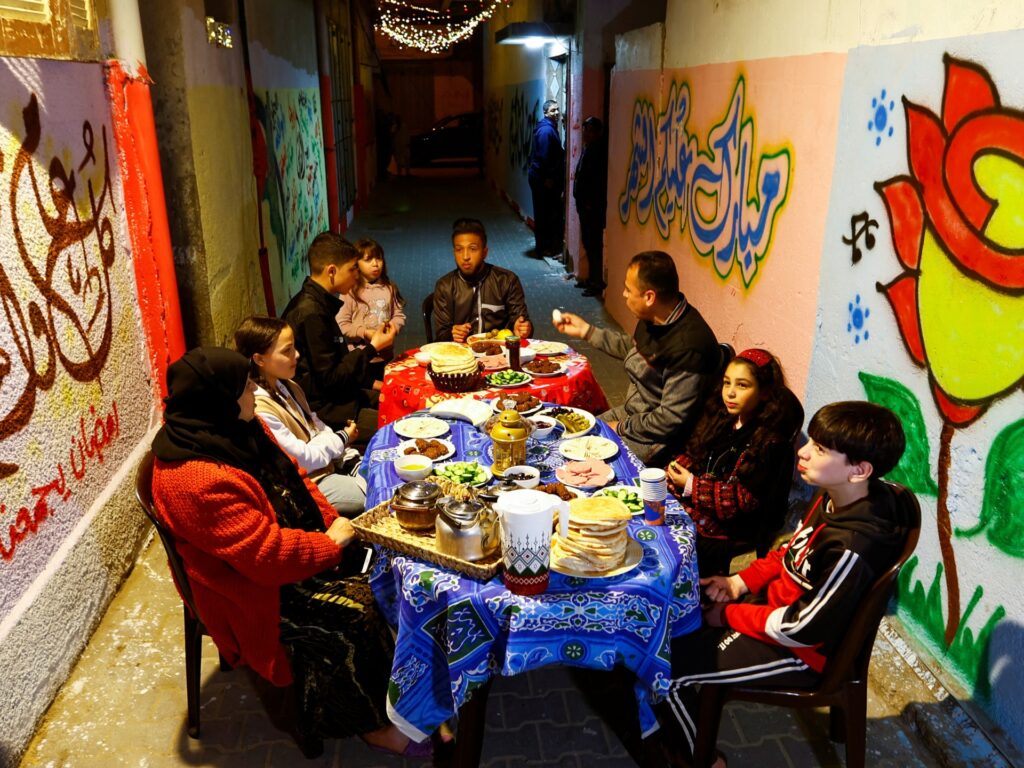The holy month of Ramadan has begun. Muslims around the world fast, spend time with family, and devote themselves to prayer and worship. But for us Muslims in Gaza, this holy month is filled with sorrow and mourning.
For more than five months now, we have suffered massacres, disease, starvation and thirst at the hands of the Israeli army. Its violence and brutality neither stopped nor diminished at the start of Ramadan.
While many of us struggle to put food on the table to break the fast or find a safe place to pray, memories of Ramadans past keep us warm. Amid the buzz of Israeli drones and the sound of explosions, I close my eyes and remember the splendor of Ramadan in Gaza.
Preparations for the holy month always began early. Several weeks before, people were going shopping for all the basic Ramadan necessities.
A favorite place to go would be the Old City and its traditional market, Al-Zawiya. There were all the traditional Ramadan food items: sour pickles, the best dates, delicious olives, spices that filled the air with their aroma, thyme, dried apricot paste to make qamar al-drinks. din, dried fruits and various types. of juice, khoroub (carob) being the most popular.
New clothes would also be a necessary purchase. Prayer dresses would be a popular choice, as would fancy dress costumes for girls and smart suits for boys.
Children pulled on their parents’ hands and asked them to buy one of the colorful lanterns on display that read “hallou ya hallou, Ramadan Kareem ya hallou” (“dear, dear, Ramadan Kareem, dear”).
The streets would be full of people, decorations would be put up, joyful Ramadan songs would be played. The atmosphere of anticipation would be unlike any other.
Then, on the eve of the first day of Ramadan, the neighborhoods of Gaza were filled with the sound of tarawih prayers. Children would go out late into the streets, play in the streets, hold lanterns, sing and light fireworks to mark the beginning of the holy month.
Families gathered to share the al-suhur meal and pray al-fajr together. Then some might take a nap, others would go out to school and work. In the afternoon, everyone would be back home and it would be time to read the Holy Quran. Children read and memorized the verses at home or in mosques. Parents and grandparents told stories of the prophets to their children and grandchildren.
Then it would be time to prepare the food for the iftar meal. An hour before sunset, the entire neighborhood was filled with the delicious smells of various foods. The kitchen of each house would be full of hard-working people: one preparing maqlouba (a meat dish with rice and vegetables), another musakhan (chicken dish), and yet another mulukhiya (soup jute).
Meanwhile, a neighbor may stop by and bring a tray full of the food their family has just prepared; Of course, he wouldn’t be allowed to go home empty-handed.
As sunset approached, the iftar table was set and everyone sat down. Soon, the call from mosques to break the fast would ring out, accompanied by the melody of takbirat. Everyone was sharing the delicious food, chatting happily and laughing.
After iftar, men, women and children headed to mosques to pray tarawih together, the sounds of the Holy Quran and prayers permeating every part of Gaza. Then the most joyful time of the day would come for the children, as moms prepared qatayf, a popular dessert prepared only during the holy month.

Once the qatayf was over, families would visit each other or gather in front of the television to watch their favorite Ramadan series.
For the people of Gaza, Ramadan is indeed the most special time of the year. Gaza during Ramadan is the most beautiful place on earth.
But this holy month we cannot celebrate and enjoy worship in peace. Colorful lights and lanterns, chants and songs have been replaced by flashes of lightning and the sounds of exploding Israeli bombs. The joyful sound of children playing outside in the streets was replaced by the screams of people buried under rubble after another Israeli bombardment. Neighborhoods full of life have been transformed into cemeteries. The mosques are not crowded with people because they are all destroyed. The streets are not full of people, because they are all covered in rubble. People fast after iftar because they have no food or water.
Families do not come together to greet each other and celebrate, but to mourn the dead together. As the holy month of Ramadan begins, we bid farewell to martyr after martyr.
The pain is further compounded by the realization that the world has abandoned the Palestinian people, allowing Israel to continue its genocide during the Muslim holy month.
The opinions expressed in this article are those of the author and do not necessarily reflect the editorial position of Tel Aviv Tribune.

